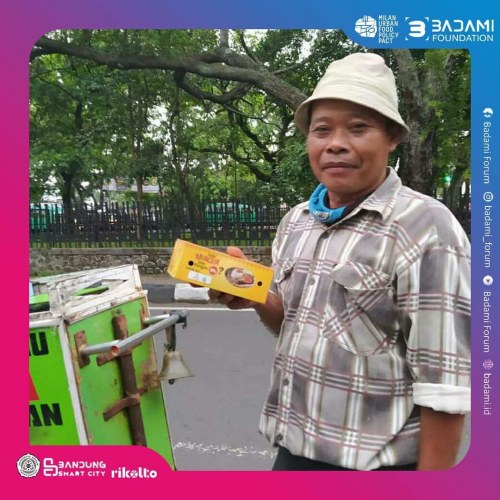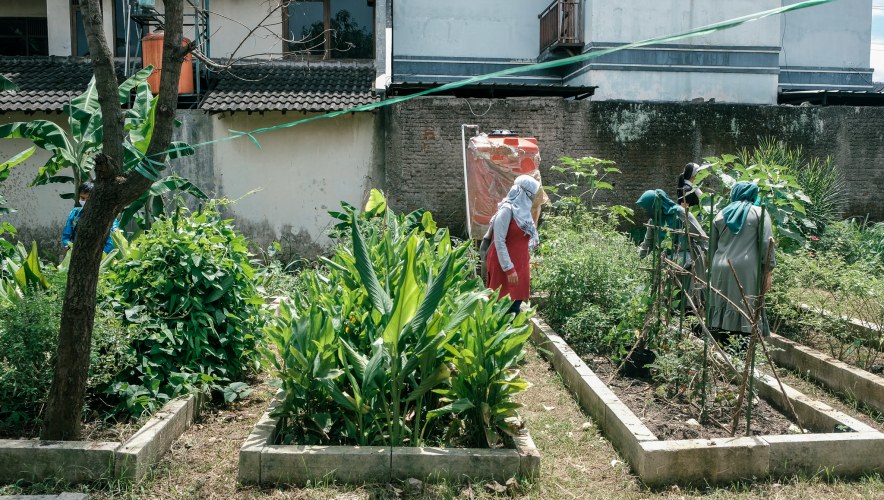In October 2020, we embarked on a project with Badami Foundation, Parahyangan University, and Ketapang Kita to develop innovative solutions to improve access to affordable food and address the growing issue of food waste in Bandung. This project focuses on developing a food sharing platform, raising public awareness, and empowering communities through urban farming and better waste management.
Food sharing and urban farming as solutions to reducing urban food waste
Food sharing and urban farming as solutions to reducing urban food waste
BADAMI: A digital solution to share and donate excess food
Indonesia is the world's second-largest food waster, dumping 13 million tons of food waste annually. On average, the city of Bandung alone produces 1,447 tonnes of waste daily, of which 63% is organic.[1] Badami food sharing, launched in December 2020, offers an innovative solution to reduce food waste while supporting those who need it most. Badami connects food suppliers and consumers through their platform https://smartfood.badami.id/ that functions both as a marketplace for micro, small, and medium enterprises (MSMEs) and a donation hub for sharing food surpluses.
As of April 2021, four months after its launch, the Badami food sharing has donated surplus food to more than 1,558 people, saving 779 kilograms of food that would otherwise go to landfills. The achievement of Badami is a result of a strong collaboration involving the City Government, Parahyangan Catholic University, support from Rikolto, and active community participation.
Badami has been working closely with the Department of Agriculture and Food Security, and Department of Communication & Informatics as part of the city programme related to food. It was also recently incorporated into the Bandung Smart City program, initiated by the City Government to integrate innovative tech-based solutions to address urban challenges, promote sustainable solutions, and improve Bandung citizens' livelihoods.
With support from the government, Badami can gain more exposure, hence saving more food from getting wasted. Internationally, Badami also became one of the initiatives selected to be showcased by the Milan Urban Food Policy Pact (MUFPP) committee as part of the Milan Pact Awards 2020.

To inspire more people in adopting better behaviour towards food, this project also conducts awareness-raising activities through various social media platforms. Led by the team from Parahyangan University, the content shared on social media focuses on sharing facts about the danger of food waste and simple, practical tips to reduce food loss. Another highlight is the launch of "Tiwi & Pusaran Kehidupan", a book written by Tini Martini from Ketapang Kita in February 2021. This book is an educational tool for teaching children about the organic cycle and instil a sense of care for the environment from an early age.
"There's currently no other digital platform in Indonesia that directly involves various food producers such as supermarkets, hotels, restaurants, cafes, bakeries, and caterings. By involving more members of the community, food sharing can become part of the culture that promotes a better, smarter approach towards food."

Nine out of ten MSMEs in Indonesia are facing lower demand during the pandemic, according to research by the United Nations Development Program (UNDP) and the University of Indonesia's Institute for Economic and Social Research (LPEM).[2] In addition to reducing food waste, Badami was also able to increase MSMEs' income by allowing people to purchase food to be donated to those in need.

Vina, a business owner and an event organiser specialist, has a vast network of food vendors from years of organising food bazaars and festivals in Bandung. Joining Badami as part of the committee, she invited many businesses in her network to participate in the program. During the Bandung Virtual Food Festival held on 21 February 2021, ten of Vina's business owners' friends were able to get catering orders for food donation.
"I'm very happy to be involved in Badami. I can help others and empower small business owners at the same time. Just this morning, we donated food to a nearby orphanage."

A multistakeholder approach is essential to make a dent in reducing food loss and strengthening the food system. With support and commitment from partners, Badami continues to grow, with currently 101 food sellers, 241 products, and 1,028 users registered on its platform.
Improved waste management through urban farming
In addition to developing a food sharing platform, this project also empowered communities in Bandung to grow their own nutrition garden and reduce organic waste through urban farming. Named the "School of Life" ("Sekolah Kehidupan"), the urban farming project follows the principle of Human-Centered Design to engage and improve women's participation in solving food waste challenges in their area.
The School of Life was conducted in several sub-districts in Bandung, including Cikutra, Jamaras, Cisaranten Kulon, and Ciumbuleuit. Learning and gathering inputs from each neighbourhood was vital in ensuring the effectiveness of the project. The urban farming activities include composting workshops, gardening activities and assistance, waste management, and lessons on utilising organic waste. All activities were conducted with a health and safety protocol in place to prevent the spread of COVID-19.
"Since joining the School of Life, I started to grow more food in my garden for my daily consumption. In my neighbourhood, Jamaras Asri, we learned to separate waste, make eco-enzyme, and produce soaps and candles from used cooking oil. Before this, I didn't know that waste could be so useful. We can even save money from making eco-enzyme and our own soap."

During the course of six months, our partner Ketapang Kita was able to engage 150 households to take part in urban farming. As much as 542 kilograms of vegetables and fruits were produced from urban farming, providing nutritious organic food for families and reducing the cost of buying fresh food. Urban farming also had a significant impact in reducing food waste, with more than 3,3 tonnes of food waste saved and processed into organic fertiliser.
"Now I'm able to make molasses and eco-enzyme from food waste. I use molasses as liquid fertilisers and to remove foul odours. As for eco-enzyme, I use it for so many things, such as to wash my clothes, disinfect, clean floors, air freshener, and even to heal my wound."

From reducing food waste, saving money, better nutrition, to boosting the community's sense of togetherness, we learned that the benefits of urban farming are multifold. We are proud to have witnessed the achievements of the School of Life students, and we left inspired by how they are able to become the agent of change in their communities.

Funded by the Vandersypen Foundation, this project is part of Rikolto's Food Smart City program and our COVID-19 response to assist partners and communities in setting up innovative solutions to transform our food system in the long run.
Source:
City of Bandung’s Environment and Hygiene Services (Dinas Lingkungan Hidup dan Kebersihan Kota Bandung) data regarding waste in Bandung.
https://www.id.undp.org/content/indonesia/en/home/library/ImpactofCOVID19MSMEs.html.


















